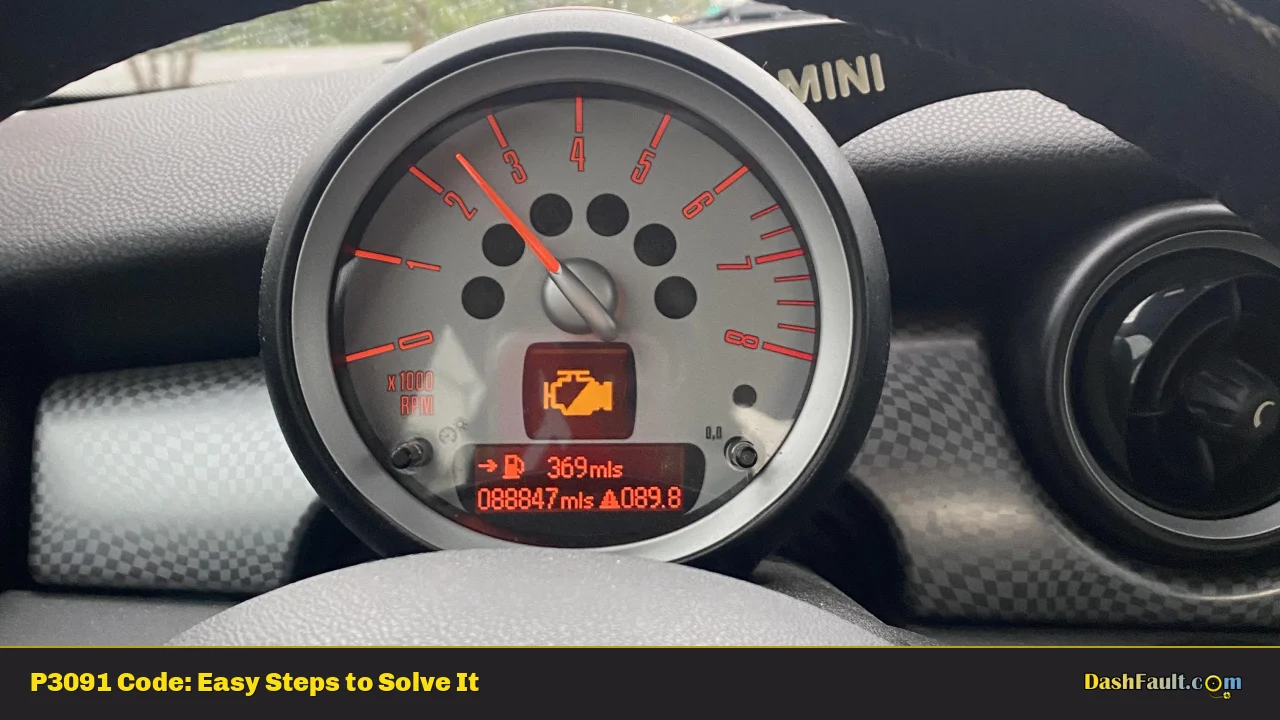The P3091 trouble code is a diagnostic trouble code (DTC) that indicates a problem with the fuel system, specifically related to the high-pressure fuel pump (HPFP) in a vehicle. This code typically signals that the engine control module (ECM) has detected that the fuel pressure is below the desired level during operation. When this occurs, it can lead to performance issues, including rough idling, stalling, and reduced power output. Understanding and diagnosing this code is crucial for vehicle owners and DIY mechanics who want to maintain optimal engine performance.
| P3091 Code Meaning | P3091 Code Common Causes |
|---|---|
| High Pressure Fuel Below Desired Level | Faulty High-Pressure Fuel Pump (HPFP) |
| Fuel Delivery Issues | Clogged Fuel Filter |
| Fuel Pressure Sensor Malfunction | Low-Pressure Fuel Pump Failure |
| Electrical Issues in Fuel System | Fuel Line Blockage or Leak |
| Engine Misfires or Rough Idle | Faulty Fuel Injectors or Ignition Components |
Symptoms of P3091 Code
When the P3091 code is triggered, drivers may experience several symptoms that indicate a problem with the fuel system. Common symptoms include:
- Rough Idling: The engine may idle unevenly or shake.
- Stalling: The vehicle might stall unexpectedly, especially during acceleration or at stops.
- Loss of Power: There may be a noticeable decrease in engine power during acceleration.
- Difficulty Starting: The engine may take longer to start or require multiple attempts.
- Check Engine Light: The check engine light will illuminate on the dashboard.
Technical Explanations
The P3091 code is primarily associated with the high-pressure fuel system in modern vehicles. The HPFP is responsible for delivering fuel from the low-pressure side of the fuel system to the engine at high pressure. If the ECM detects that the fuel pressure is below the expected range, it triggers the P3091 code.
How Fuel Pressure Affects Engine Performance
Fuel pressure is critical for optimal engine performance. Insufficient pressure can lead to inadequate fuel delivery, resulting in:
- Incomplete combustion
- Increased emissions
- Engine misfires
- Reduced throttle response
Step-by-Step Diagnosis
Diagnosing a P3091 trouble code requires a systematic approach to identify and rectify the underlying issue. Here are steps to follow:
- Scan for Codes: Use an OBD-II scanner to confirm the presence of the P3091 code and check for any additional codes that may provide further insight into the problem.
- Visual Inspection:
- Check for any visible leaks in the fuel lines.
- Inspect electrical connections related to the HPFP and sensors.
- Test Fuel Pressure:
- Use a fuel pressure gauge to measure the actual fuel pressure at the rail.
- Compare it against manufacturer specifications.
- Check HPFP Operation:
- Listen for unusual noises from the HPFP.
- Ensure it engages correctly when starting.
- Inspect Related Components:
- Examine the low-pressure fuel pump and filter for clogs or failures.
- Check injectors for proper operation.
- Review Electrical System:
- Test fuses and relays associated with the fuel system.
- Inspect wiring for damage or corrosion.
Solution Methods
Once you have diagnosed the cause of the P3091 code, you can implement appropriate solutions based on your findings:
- Replace High-Pressure Fuel Pump: If testing indicates that the HPFP is faulty, replace it with an OEM part.
- Clean or Replace Fuel Filter: A clogged filter can restrict flow; replacing it can restore proper pressure.
- Repair Electrical Issues: Fix any damaged wiring or connectors that may be affecting pump operation.
- Replace Low-Pressure Fuel Pump: If testing reveals low pressure from this component, consider replacing it as well.
- Inspect and Replace Injectors: If injectors are found to be faulty, replace them to ensure proper fuel delivery.
Cost Estimates
The costs associated with repairing a P3091 code can vary widely depending on several factors:
- High-Pressure Fuel Pump Replacement: $400-$800 (parts and labor)
- Fuel Filter Replacement: $50-$150
- Low-Pressure Fuel Pump Replacement: $300-$600
- Fuel Injector Replacement: $100-$300 per injector
Warnings and Recommendations
Important Warning: Always handle fuel system components with care due to flammability risks.
Recommendations:
- If you are not comfortable performing these diagnostics or repairs yourself, seek professional assistance from a certified mechanic.
- Regular maintenance of your vehicle’s fuel system can prevent issues like those indicated by a P3091 code.
Closing Paragraph
The P3091 trouble code can be concerning for vehicle owners and DIY mechanics alike, but understanding its implications and how to address it can help maintain your vehicle’s performance. By following systematic diagnostic steps and implementing appropriate solutions, you can resolve issues related to this code effectively. Always prioritize safety and consider consulting with professionals when necessary to ensure your vehicle remains reliable on the road.
Frequently Asked Questions About P3091
- What does P3091 mean?
P3091 indicates that there is insufficient high-pressure fuel being delivered to the engine. - Can I drive my car with a P3091 code?
While it may be drivable temporarily, it’s advisable to address this issue promptly as it can lead to further engine problems. - What are common causes of P3091?
Common causes include a faulty high-pressure fuel pump, clogged filters, electrical issues, or injector problems. - How do I clear a P3091 code?
You can clear the code using an OBD-II scanner after addressing any underlying issues. - Will replacing just one part fix my P3091 issue?
Not necessarily; it’s important to diagnose all potential causes as multiple components could be contributing. - How much does it cost to fix a P3091 code?
The repair costs can range from $50 for minor fixes up to $800 or more for major component replacements. - Can I fix this issue myself?
If you have mechanical knowledge and tools, many aspects of diagnosing and repairing a P3091 code can be done at home. - When should I seek professional help?
If you’re unsure about diagnosing or fixing issues related to your vehicle’s fuel system, it’s best to consult a professional mechanic.
